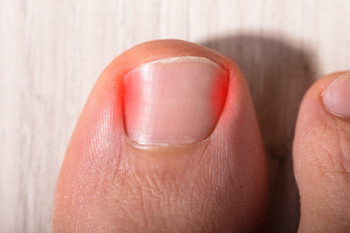Connect With Us
Blog

Toe pain can signal an underlying issue with how blood flows to and from the lower extremities. Because the toes are farthest from the heart, they are often affected first when circulation becomes compromised. Signs of poor circulation include coldness, color changes such as pale, bluish, or reddish tones, or swelling that worsens throughout the day. Some people notice numbness, tingling, or even pain during walking that subsides with rest, which can indicate restricted blood flow. Discoloration or thickened toenails, especially when accompanied by slow healing of minor cuts or sores, may also suggest poor circulation. People with diabetes are especially vulnerable, as nerve damage and vascular disease can reduce blood supply and increase the risk of infections or tissue damage. A podiatrist can conduct a thorough examination and order diagnostic testing to determine the cause. Treatment may involve medication, circulation assessments, or surgery, in more severe cases. If you are experiencing toe pain, it is suggested that you schedule an appointment with a podiatrist for a diagnosis and appropriate treatment.
Poor circulation is a serious condition and needs immediate medical attention. If you have any concerns with poor circulation in your feet contact Arthur Segall, Jr., DPM of Segall Foot and Ankle. Our doctor will treat your foot and ankle needs.
Poor Circulation in the Feet
Poor blood circulation in the feet and legs is can be caused by peripheral artery disease (PAD), which is the result of a buildup of plaque in the arteries.
Plaque buildup or atherosclerosis results from excess calcium and cholesterol in the bloodstream. This can restrict the amount of blood which can flow through the arteries. Poor blood circulation in the feet and legs are sometimes caused by inflammation in the blood vessels, known as vasculitis.
Causes
Lack of oxygen and oxygen from poor blood circulation restricts muscle growth and development. It can also cause:
- Muscle pain, stiffness, or weakness
- Numbness or cramping in the legs
- Skin discoloration
- Slower nail & hair growth
- Erectile dysfunction
Those who have diabetes or smoke are at greatest risk for poor circulation, as are those who are over 50. If you have poor circulation in the feet and legs it may be caused by PAD and is important to make changes to your lifestyle in order to reduce risk of getting a heart attack or stroke. Exercise and maintaining a healthy lifestyle will dramatically improve conditions.
As always, see a podiatrist as he or she will assist in finding a regimen that suits you. A podiatrist can also prescribe you any needed medication.
If you have any questions please feel free to contact our offices located in Plantation, FL Ft. Lauderdale, F . We offer the newest diagnostic and treatment technologies for all your foot and ankle needs.

An ingrown toenail occurs when the edge of the toenail grows into the surrounding skin, leading to irritation and discomfort. This condition most often affects the big toe and can develop gradually. Symptoms include redness, swelling, pain when pressure is applied, and in some cases, drainage or signs of infection. Common causes include improper nail trimming, wearing tight footwear, and repeated trauma to the toe. Individuals with curved or thickened nails, poor foot hygiene, or a family history of the condition may be more at risk. Identifying an ingrown toenail early allows for prompt treatment and helps avoid complications. If you have an ingrown toenail, it is suggested that you promptly visit a podiatrist who can offer appropriate treatment solutions before it becomes infected.
Ingrown toenails may initially present themselves as a minor discomfort, but they may progress into an infection in the skin without proper treatment. For more information about ingrown toenails, contact Arthur Segall, Jr., DPM of Segall Foot and Ankle. Our doctor can provide the care you need to keep you pain-free and on your feet.
Ingrown Toenails
Ingrown toenails are caused when the corner or side of a toenail grows into the soft flesh surrounding it. They often result in redness, swelling, pain, and in some cases, infection. This condition typically affects the big toe and may recur if it is not treated properly.
Causes
- Improper toenail trimming
- Genetics
- Improper shoe fitting
- Injury from pedicures or nail picking
- Abnormal gait
- Poor hygiene
You are more likely to develop an ingrown toenail if you are obese, have diabetes, arthritis, or have any fungal infection in your nails. Additionally, people who have foot or toe deformities are at a higher risk of developing an ingrown toenail.
Symptoms
Some symptoms of ingrown toenails are redness, swelling, and pain. In rare cases, there may be a yellowish drainage coming from the nail.
Treatment
Ignoring an ingrown toenail can have serious complications. Infections of the nail border can progress to a deeper soft-tissue infection, which can then turn into a bone infection. You should always speak with your podiatrist if you suspect you have an ingrown toenail, especially if you have diabetes or poor circulation.
If you have any questions, please feel free to contact our offices located in Plantation, FL Ft. Lauderdale, F . We offer the newest diagnostic and treatment technologies for all your foot care needs.

Some people develop a hard lump under the toenail, often near the big toe. This bump, known as subungual exostosis, is an overgrowth of bone that can push the nail upward or make shoes feel uncomfortable. Over time, the pressure may lead to a painful ingrown toenail, a condition called chronic onychocryptosis. This happens when the nail grows into the surrounding skin, causing swelling, redness, and sometimes infection. The bone growth and the ongoing nail problem often go hand in hand, making the toe sore and hard to treat at home. A podiatrist can take X-rays to confirm the bone growth and suggest the best treatment, which may include minor surgery to remove the bump and help the nail grow normally again. If you have a painful or abnormal toenail that does not get better, it is suggested that you see a podiatrist for a proper diagnosis and appropriate treatment.
Toe pain can disrupt your daily activities. If you have any concerns, contact Arthur Segall, Jr., DPM of Segall Foot and Ankle. Our doctor can provide the care you need to keep you pain-free and on your feet.
What Causes Toe Pain?
Most severe toe pain is caused due to a sports injury, trauma from dropping something heavy on the toe, or bumping into something rigid. Other problems can develop over time for various reasons.
Toe pain can be caused by one or more ailments. The most common include:
- Trauma
- Sports injury
- Wearing shoes that are too tight
- Arthritis
- Gout
- Corns and calluses
- Hammertoe
- Bunions
- Blisters
- Ingrown toenails
- Sprains
- Fractures (broken bones)
- Dislocations
When to See a Podiatrist
- Severe pain
- Persistent pain that lasts more than a week
- Signs of infection
- Continued swelling
- Pain that prevents walking
Diagnosis
In many cases the cause of toe pain is obvious, but in others, a podiatrist may want to use more advanced methods to determine the problem. These can range from simple visual inspections and sensation tests to X-rays and MRI scans. Prior medical history, family medical history, and any recent physical traumatic events will all be taken into consideration for a proper diagnosis.
Treatment
Treatments for toe pain and injuries vary and may include shoe inserts, padding, taping, medicines, injections, and in some cases, surgery. If you believe that you have broken a toe, please see a podiatrist as soon as possible.
If you have any questions please feel free to contact our offices located in Plantation, FL Ft. Lauderdale, F . We offer the newest diagnostic tools and technology to treat your foot and ankle needs.

Ankle fractures can involve different bones and vary in severity depending on the location and extent of the injury. The tibia, the larger bone of the lower leg, can break near the ankle joint, affecting stability and weight-bearing ability. The fibula, the smaller bone on the outer side of the leg, is also commonly fractured in ankle injuries. The talus, a small bone between the tibia and heel, plays a vital role in movement and can be damaged in high-impact injuries. A lateral malleolus fracture affects the outer part of the ankle, while a medial malleolus fracture occurs on the inner side. A bimalleolar fracture involves both sides of the ankle, often leading to significant instability. If you have fractured your ankle, it is suggested that you promptly visit a podiatrist who can determine what the type is, and offer the treatment that is best for you.
Broken ankles need immediate treatment. If you are seeking treatment, contact Arthur Segall, Jr., DPM from Segall Foot and Ankle. Our doctor can provide the care you need to keep you pain-free and on your feet.
Broken Ankles
A broken ankle is experienced when a person fractures their tibia or fibula in the lower leg and ankle area. Both of these bones are attached at the bottom of the leg and combine to form what we know to be our ankle.
When a physician is referring to a break of the ankle, he or she is usually referring to a break in the area where the tibia and fibula are joined to create our ankle joint. Ankles are more prone to fractures because the ankle is an area that suffers a lot of pressure and stress. There are some obvious signs when a person experiences a fractured ankle, and the following symptoms may be present.
Symptoms of a Fractured Ankle
- Excessive pain when the area is touched or when any pressure is placed on the ankle
- Swelling around the area
- Bruising of the area
- Area appears to be deformed
If you suspect an ankle fracture, it is recommended to seek treatment as soon as possible. The sooner you have your podiatrist diagnose the fracture, the quicker you’ll be on the way towards recovery.
If you have any questions, please feel free to contact our offices located in Plantation, FL Ft. Lauderdale, F . We offer the newest diagnostic and treatment technologies for all your foot care needs.
